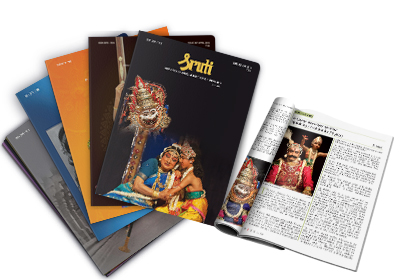
Not perhaps since the days of Veena S. Balachandar has a leading Carnatic musician traversed a path as unusual. Bombay Jayashri was all of 28 when she began a truly full-fledged performing career in Carnatic music. Though introduced in early childhood to Carnatic music, thanks to both her parents being music teachers, she grew up in cosmopolitan Bombay, revelling in the singing of bhajan-s and film music at functions small and large all over Maharashtra and Gujarat, learning Hindustani classical music, ‘geet’, film songs, and a variety of ‘light music’ genres.
Through childhood and college, she almost kept her training in Carnatic music a secret. She had a ball singing jingles in several languages extolling the wonderful attributes of Bournvita, Mealmaker and Rexona, solo or in duets. Throughout this period, she was also learning Carnatic music from the rigorous school of T.R. Balamani, a renowned teacher of Bombay, who also taught the likes of Shankar Mahadevan. She loved the film songs of Rafi, Lata and Asha, and continues unabashedly to do so, despite stardom in Carnatic music. Mehdi Hasan and Farida Khanum are equally her favourites. She attributes her pitch perfect voice to her training in Hindustani music and her soulful articulation to her eclectic musical background.
She rarely performs in Chennai these days. Her December season concerts here are now limited to seven – to be reduced by one more next year, according to an insider. Sruti suddham and a contemplative quality mark her singing. A noticeable feature of her concerts is the superior aesthetics of her singing. In the past – especially after she resurfaced on the kutcheri platform after a four-year hiatus spent in drinking deep of the Lalgudi bani of music under violin maestro Jayaraman’s tutelage – she was accused of sweet, rather than deep music, crooning, and even singing “like the violin” in a soft voice.
Jayashri is undoubtedly one of the leading lights of Carnatic music today, with a considerable fan following. She has also taken upon herself the task of propagating the music among young Indians in India and abroad. In partnership with T.M. Krishna she is involved in initiatives towards creating future rasika-s as well as future musicians with a keen sense of history and tradition. The organisation they founded, Matrka, brought out a coffee table book, Voices Within, a tribute to seven past masters of Carnatic music, and runs an annual event entitledSvanubhava, introducing to young students the great music of the past through veteran musicians reliving for them the art of their guru-s and forgotten traditions.
One of Jayashri’s greatest assets has been her closely-knit, supportive family. Her father, N.N. Subramaniam was a keen amateur singer and teacher, who did not live to see her become a successful vocalist. It was her mother’s dream that she has lived out. Her two brothers Balarajan and Sabesh are strong pillars of support. (“They will drop everything and run to her if she needs them,” says sister-in-law Janaki Sabesh who combines a successful career marketing digital cinema with acting in films, and is a trained vocalist herself). Both brothers have learnt enough Carnatic music to critique and advise Jayashri. Both are company executives and pursue music in their spare time, Sabesh carrying on the family tradition of music teaching. Jayashri’s husband Ramnath, a finance professional, is a genuine lover of music who enjoys singing Hindi and Bengali film songs.
The extended family meets every year at some holiday spot; both during these vacations and at every family get-together, planned or spontaneous, there is much music, from film to classical, and there is much discussion of music as well. Janaki has also been associated withMargazhi Ragam, the offbeat film of a Carnatic music concert featuring T.M. Krishna and Jayashri, through Real Image, the company she works for.
The behind the scenes person most responsible for Jayashri’s growth as a musician has been her mother Seetha. Forced by her husband’s premature death to teach music for a living, she discovered when Jayashri was barely three, that she was gifted, from the way she picked up the nuances of the Ranjani varnam while she was teaching older children the song in the next room. Seetha’s tastes in music are unusually eclectic and she believed in exposing Jayashri to a wide range of musical influences. Whenever she heard a good musician or teacher, she made sure Jayashri had a chance to learn from him or her.
Jayashri is a picture of confidence as a musician. She has a healthy self-esteem that enables her to take criticism in her stride. “Once you become a performing musician, you should be prepared to face and accept criticism,” she recently told a group of young journalism students. (She bowled them over comprehensively with her candour and willingness to share). For someone of immense pride in her art, she is also a humble student, willing to surrender to the teacher. Her attitude to criticism is best exemplified by an incident some ten years ago, when she sought help from a reviewer – who had strongly criticized one of her concerts – to make some corrections, because she believed it was a case of constructive criticism.
People who know Jayashri personally describe her as a good human being, a kind and helpful one. She can be a thoughtful friend, relative or neighbour, with no celebrity airs about her, and she can be generous with her time as the journalism students recently found out, but she is completely professional when it comes to work. She can be reclusive, unavailable to friends and rasika-s, “an enigma” as a friend put it, especially while preparing for a concert. Don’t expect her to attend a feast the day before a concert, no matter how close you may be to her. That is the time she needs to practise, meditate, rest. She needs time to herself, to reach towards her ultimate musical goals. “The best of Jayashri is yet to come,” her mother told us. A happy prospect.


